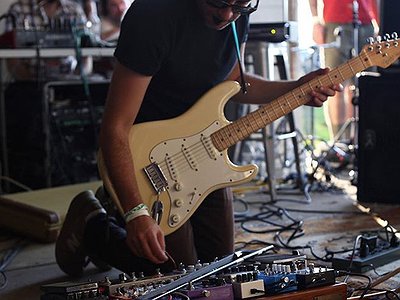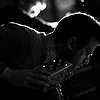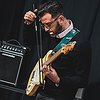There are many descriptions of the ideal state of mind for being creative. What is it like for you? What supports this ideal state of mind and what are distractions? Are there strategies to enter into this state more easily?
The state of self-forgetting is a space in which the most important things that can happen inside us are able to happen to us. I’ve been interested in those kinds of experiences (I think we all are) most of my life: the moment in second-nature and “first”-nature come together. The moment where you are writing and your hands are your mouth, or when you are playing and the instrument is your voice, such that if someone speaks to you, in response you “play at them” instead of replying.
I once took part in a legendary seminar at the University of Chicago co-taught by Arnold I. Davidson and George Lewis. We covered a lot in that conversation, but George Lewis had us read some work by the psychologist Mihaly Csikszentmihalyi (who passed away on 10/20/21), who wrote about what he called “flow states” or “peak experience.” I think the term “flow” is a little cheesy sounding, but the idea is central: when doing things at a high level, we enter what people sometimes call a “zone” and our relationship to ourself fundamentally changes.
I study religion, and the work on what we call “religious” or “ecstatic” experiences in some ways deals with this kind of question too (see William James’ Varieties of Religious Experience, or Friedrich Schleiermacher, or more recently Wayne Proudfoot and definitely Ann Taves on all of this). I don’t think these are always the same, but they do raise the same really important practical question: how do you cultivate such a state? Again, I think the profound is rooted in the mundane (and as always it’s an economic question too, and a health-question). Having the time to just sit with yourself, with your materials, to just be there long enough (and it could take a minute and it could take an hour) to allow this state of self-forgetting to overtake you.
There are important things you can do, indirectly of course: Having a work / rehearsal / studio space that feels like home—I think that’s important, it’s got to feel like home, is crucial—though not necessary. Another crucial thing is to remain inspired: it does not matter if the thing that inspires you is also a form of the thing that you’re doing. Listening to music constantly helps me stay both in the musical headspace, but also excited about making new things.
At the same time, being in a creative space is dependent for me on a steady diet of non-musical inspirations. Reading, and reading all kinds of stuff—philosophy, religious texts, nature writing, whatever—is central, but so is making sure to get outside as much as possible.
Music and sounds can heal, but they can also hurt. Do you personally have experiences with either or both of these? Where do you personally see the biggest need and potential for music as a tool for healing?
Making music, in the past several years, has been a key form of processing grief in various forms, a way to mourn—not a way to “work through” a morning process, but something that is the mourning process itself. I hope, and I think we can only hope, for no aspect of any of this music to ever cause any form of harm. I hope that it gives people the comfort that making it has given me.
I’ve lost a lot of people in the past ten years. Almost none of the music I’ve made in that time (with about one exception) directly addresses any of that loss, though making it has often been a way to process loss. This is related to something else: I do not, at all, think that the content of music has to explicitly address an issue or event for the music itself to “address” that issue or event. The therapeutic work is more often, and I think better, in the process of writing and recording, the form that the music takes, the experience of listening. All of these are much more tangible to me in terms of what music does and can do than, say, lyrics that address an issue, or a description that we tack onto the wall next to the piece.
This then leads to my answer to the second question: I think that the most important work that music can do as a form of healing may not be in the experience of listening, but in the forms of community that it can—sometimes—help constitute. I also came up in the DIY world, and I saw there that the lyrical content of political songs was often not very important, and not very impactful. But the forms of community building, the little experiments in democracy, the ways that some of these things brough people together who needed people to be together with, that was where it stuck me the deepest value and the lasting work could be done—all while understanding how often and how profoundly all of that could fail, over and over, with terrible consequences as well.
So, there is a danger: music can create community, or bonds of empathy across different experiences, but it can also do the opposite. Like anything else, there is no inherent or necessary direction for any of this to go. It’s on us not simply to make music with the assumption that it will naturally do healing work for others. It’s work to make sure that it actually does and can bring that about.
There is a fine line between cultural exchange and appropriation. What are your thoughts on the limits of copying, using cultural signs and symbols and the cultural/social/gender specificity of art?
I think that the best thing I’ve ever read, or at least something that has really stayed with me (especially as a white artist), on the question of cultural appropriation, was a 2017 article by Brianna Joy Gray in Current Affairs. We can mean at least two things when we talk about this. On the one hand, there is a form of economic exploitation that is (at least most of the time) grounded in forms of racist exclusion, segregation, etc. This is ultimately an important structural critique, and it’s why arguably the most famous, go-to example of cultural appropriation, someone like Elvis, is such a clear example.
In this case, a white artist was able to be crowned “king” of a genre developed and rooted in Black life, experience, and music, to make enormous amounts of money, and to become a symbol of that genre, through legal and de facto forms of segregation. The opportunity existed for him because it did not exist for others. It’s also extremely important to understand that it is not an issue of whether Elvis was “good” or not—we can assume Elvis was an extremely good musician, did a great job playing this music, etc., and the problem would still exist, because it is a structural, material problem of access and opportunity, not a matter of taste.
The other form that this takes can be described more in terms of general kinds of disrespect, especially through imitation, which we need to recognize more consistently is not a “form of flattery” (here the famous examples are of non-indigenous people wearing Native American headdresses as costumes, or of blackface, and so on). Often, these things can go together, and we see it in music or other kinds of popular culture often: non-Black artists in some genres will take up themes or symbols rooted in Black experiences to tell a story that is likely not one’s own story.
While I owe a lot personally to a band like Led Zeppelin, they owed even more to someone like Willie Dixon (the legendary songwriter, arranger, polymath of Chess Records). When asked why songs like “Whole Lotta Love” sounded like Dixon songs, they always demurred. It would have been incredibly easy to simply own up, and tell their vast number of fans: “yes, and you have to check this guy out, buy all his records, etc.” or bring him and other Black artists on tour. In other words, begin a genuine dialogue from a place of honesty, though one with tangible economic outcomes.
There are no clear or easy answers to all of this however, as it is possible to expand this concept of appropriation so far that it excludes the idea of exchange altogether. As a principle, and an imperfect one, it seems as though the most important first step is to be clear, explicit, and vocal about who your inspirations are. Another step would be, on practical level, that if an artist is inspired or influenced by a culture or group not their own, to provide whatever material support they can to others: invite people to be on your bills, or seek out collaborations, or purchase the work of other artists, and any other form of material support.
In the end, it may not always be clear what to do, as many people will interpret the same acts differently, but it seems clear that supporting other artists, especially artists from backgrounds and lives that are not your own, and doing so in tangible, material, and economic terms is crucial. It isn’t everything, but the foundation is a material one, and it is probably the best place to start. Along with that, giving clear, explicit, and vocal credit to others, directing audiences in those directions, all lend something. A place to start, for white artists, may be something as simple as emulating Pee Wee Reese putting his arm around Jackie Robinson, though even as historical a gesture as that is still just a point of departure.
In terms of specificity, it depends on what that means. We can’t tell each other’s stories—and it is definitely offensive and ridiculous to try—but that also does not mean that things like empathy, understanding, and communication are impossible. The founders of feminist standpoint epistemology, crucially, did not think that these differences put up an absolute wall between people, far from it. It does mean that it’s a challenge and a problem, one worth actually working on: it is hard work, but hard work is the radical opposite of something that is so formally impossible we shouldn’t even try.
Ultimately, while the moral acts of individuals and small groups are important, they do not scale up on their own to systemic change. Only organizing, mass movements which challenge the material foundations of the world we live in, can bring about that kind of transformation.
Our sense of hearing shares intriguing connections to other senses. From your experience, what are some of the most inspiring overlaps between different senses - and what do they tell us about the way our senses work?
Our world is so fundamentally centered on the visual, and this is a challenge for anyone working in sonic arts of all kinds. We are trained to want to look, and often we don’t hear because we’re too busy trying to latch onto something ocular.
I think that the way that music can redirect our focus to our ears can also, in turn, help us refocus on so much else in our sensory and kinesthetic experience, if for no other reason than that it takes that focus away from our eyes. Different venues, and different events, will have a different experience of smell, for example. The “musty” smell of the musty basements so many of us have spent so much time in is crucial to those experiences. In performing music, and in listening, the tactile sense is so fundamental it can be overlooked: instruments have a specific feel, but so again do rooms, records, and so on. The sound of a string squeak on a guitar is quite literally the sound of the feeling of the instrument, and one of my favorite sounds there is, in a family of sounds that includes many other members.
This is one of the things that drew me to New Music when I first encountered it around 2006, as well as various forms of free improvisation and creative music: the consistent use of extended techniques, which are, often enough, directly concerned with embracing the tactility of different instruments. It reminds us that music is bodily, and we can’t divorce one aspect of that from the full experience. On what may seem like an unrelated note, the sounds of animals eating are always fantastic and joyful—even taste has a sound.
Art can be a purpose in its own right, but it can also directly feed back into everyday life, take on a social and political role and lead to more engagement. Can you describe your approach to art and being an artist?
I think this is a surprisingly tricky question, if I understand it correctly. I said above, I think music and art are inherently communal practices. They must exist with others, in community, and, hopefully, they contribute to that in the best possible way. As a curator especially I have tried my hardest to bring people together in a room where they can experience something powerful and good together, and leave with a sense of connection rather than a sense of alienation. I know that I have failed at this many times, and failed profoundly. It is still my goal though, to make things that I think will speak to people on their own terms: whether that is a bill I’ve organized, or a recording I’ve made, my hope—and I think we can only hope—is that it will mean something, maybe something I don’t even understand, to someone.
This is the aesthetic side, but the practical side is no less subtle: music is something that builds communities. It does this in many ways: it connects people who like the same things and listen “together” even at a distance. It brings people physically together to collaborate in music-making together, whether in a steady band or in many improvised encounters or both. It causes people to create center for writing and reflection. And it brings about physical spaces: venues, galleries, and so on. Music is constitutive of the infrastructure of everyday life.
What can music express about life and death which words alone may not?
Words are music too. By this I mean, there is the strict discursive aspect of words: they tell you a thing, and here is what that means. But this can obscure the fact that words too have an aesthetic dimension, they create moods, entail ideas and feelings that are not immediately present, suggest an image or a sense that is not there on the surface. Whether this comes from music, strictly speaking, or words in a conversation, I think this is the vague, hard-to-grasp dimension where the most important things that music can “express” are indeed expressed, the places where words in their purely discursive dimension simply won’t do, but where a glance, a trailing statement, a shift in timbre, say things that only they can.
So, for me, if I am describing grief, I am doing it with clattering or guitar timbres or soft sounds, meant to invoke something about memory and time and being where something or someone used to be. I think that if language is capable of doing the same, it does so in the same way: by using the musical, accidental, generative power of language to go beyond statements, and evoke a sense of something, an empathy with whatever is lingering around the words.
Interviews / About
Fifteen Questions Interview with Daniel Wyche
Communal Practices
Part 3

"The state of self-forgetting is a space in which the most important things that can happen inside us are able to happen to us: The moment where you are writing and your hands are your mouth, or when you are playing and the instrument is your voice."



